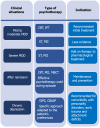Major depressive disorder: Validated treatments and future challenges
- PMID: 34877271
- PMCID: PMC8610877
- DOI: 10.12998/wjcc.v9.i31.9350
Major depressive disorder: Validated treatments and future challenges
Abstract
Depression is a prevalent psychiatric disorder that often leads to poor quality of life and impaired functioning. Treatment during the acute phase of a major depressive episode aims to help the patient reach a remission state and eventually return to their baseline level of functioning. Pharmacotherapy, especially selective serotonin reuptake inhibitors antidepressants, remains the most frequent option for treating depression during the acute phase, while other promising pharmacological options are still competing for the attention of practitioners. Depression-focused psychotherapy is the second most common option for helping patients overcome the acute phase, maintain remission, and prevent relapses. Electroconvulsive therapy is the most effective somatic therapy for depression in some specific situations; meanwhile, other methods have limits, and their specific indications are still being studied. Combining medications, psychotherapy, and somatic therapies remains the most effective way to manage resistant forms of depression.
Keywords: Antidepressants; Cognitive-behavioral therapy; Depression; Electroconvulsive therapy; Psychotherapy; Somatic therapies; Treatment.
©The Author(s) 2021. Published by Baishideng Publishing Group Inc. All rights reserved.
Conflict of interest statement
Conflict-of-interest statement: All authors declare that they have no conflict of interest related to this article.
Figures

References
-
- WHO The global burden of disease: 2004 update [Internet]. [cited 29 March 2021]. Available from: https://www.who.int/healthinfo/global_burden_disease/2004_report_update/en/
-
- Allen NB. Cognitive therapy of depression. Aaron T Beck, A John Rush, Brian F Shaw, Gary Emery. New York: Guilford Press, 1979. Aust N Z J Psychiatry. 2002;36:275–278. - PubMed
-
- Cozanitis DA. Daniel Bovet, Nobelist: muscle relaxants in anaesthesia : The role played by two neglected protagonists. Wien Med Wochenschr. 2016;166:487–499. - PubMed
-
- Domino EF. History of modern psychopharmacology: a personal view with an emphasis on antidepressants. Psychosom Med. 1999;61:591–598. - PubMed
Publication types
LinkOut - more resources
Full Text Sources

